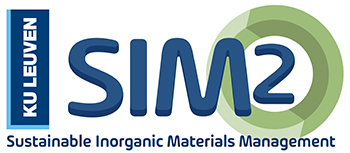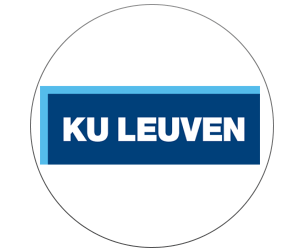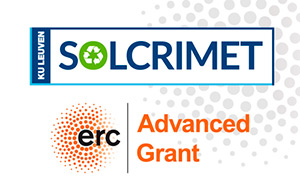Website: www.kuleuven.be
KU Leuven (KUL) boasts a rich tradition of education and research that dates back six centuries. KUL is currently by far the largest university in Belgium in terms of research funding and expenditure (EUR 455.1 million in 2015), and is a charter member of LERU. KUL conducts fundamental and applied research in all academic disciplines with a clear international orientation. In the Times Higher Education ranking KUL is ranked as the 12th European university, while in the Reuters Top 100 of the World’s most innovative institutions, KUL is listed as the first European university. Leuven participates in over 540 highly competitive European research projects (FP7, 2007-2013), ranking sixth in the league of HES institutions participating in FP7. In Horizon 2020, KUL has been approved more than 210 projects. KUL takes up the 9th place of European institutions hosting ERC grants (as first legal signatories of the grant agreement). To date, the 93 ERC Grantees (including affiliates with VIB and IMEC) in our midst confirm that KUL is a breeding ground (48 Starting Grants) and attractive destination for the world’s best researchers. One of these ERC Grantees is Prof. Koen Binnemans (ERC Advanced Grant SOLCRIMET), who is the KUL PI for NEMO.
KUL employs more than 8,000 researchers on its academic staff (2015). To strengthen international collaboration, KUL has its own international research fellowship programme and supports international scholars in international funding applications. KU Leuven Research & Development (LRD) is the technology transfer office (TTO) of the KU Leuven. Since 1972 a multidisciplinary team of experts guides researchers in their interaction with industry and society, and the valorisation of their research results (110 spin-offs created).
 In NEMO KUL participates through its SIM² KU Leuven cluster, which is a leading, interdisciplinary research cluster at KUL uniting the research groups working on Sustainable Inorganic Materials Management. SIM² KU Leuven’s mission is to perform cutting-edge fundamental, strategic and applied research contributing to cost-effective, zero-waste valorisation of End-of-Life waste, mining waste and industrial process residues, covering the full value recycling/recovery chain. Largely driven by SIM² KU Leuven, KUL hosts the Belgian-German-Dutch colocation centre for EIT KIC Raw Materials, with a focus on urban and landfill mining. KUL is the only European partner in the US NSF supported I/U Cooperative Research Centre for Materials Resource Recovery and Recycling (CR³).
In NEMO KUL participates through its SIM² KU Leuven cluster, which is a leading, interdisciplinary research cluster at KUL uniting the research groups working on Sustainable Inorganic Materials Management. SIM² KU Leuven’s mission is to perform cutting-edge fundamental, strategic and applied research contributing to cost-effective, zero-waste valorisation of End-of-Life waste, mining waste and industrial process residues, covering the full value recycling/recovery chain. Largely driven by SIM² KU Leuven, KUL hosts the Belgian-German-Dutch colocation centre for EIT KIC Raw Materials, with a focus on urban and landfill mining. KUL is the only European partner in the US NSF supported I/U Cooperative Research Centre for Materials Resource Recovery and Recycling (CR³).
 One of SIM² KU Leuven’s flagship Centres is its recently established Centre for Solvometallurgy (SOLVOMET) (cf. KUL’s key role in NEMO through WP3). SOLVOMET is developed as a Service
One of SIM² KU Leuven’s flagship Centres is its recently established Centre for Solvometallurgy (SOLVOMET) (cf. KUL’s key role in NEMO through WP3). SOLVOMET is developed as a Service
Centre for its industrial partners and large RTD Centres, who are leading actors in the fields of primary mining, mining chemicals and chemical metallurgy. SOLVOMET’s mission is to support its industrial and RTD partners in the conceptual and practical development of more sustainable solvometallurgical separation processes and new mining chemicals, which are subsequently tested using state-of-the-art labscale and mini pilot-scale experimental facilities.
Likewise, through its SIM² KU Leuven Research Line 5, KUL also has a rich tradition in sustainability assessment & policy related research, as well as multi-partner and stakeholder involvement
methodologies, which are key to obtain and maintain a Social License to Operate for primary mining, landfill mining and heavy-duty metallurgical recycling activities (cf. KUL’s role in the European Enhanced Landfill Mining Consortium, EURELCO).




